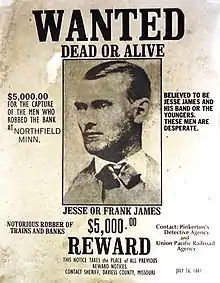outlaw
English

Robin Hood, an outlaw in English folklore.

A wanted poster for Jesse James, an American outlaw.
Etymology
From Middle English outlawe, outlagh, utlaȝe, from Old English ūtlaga (“outlaw”), borrowed from Old Norse útlagi (“outlaw, fugitive”), equivalent to out- + law. Cognate with Icelandic útlagi (“outlaw”).
Noun
outlaw (plural outlaws)
- A fugitive from the law.
- (historical) A criminal who is excluded from normal legal rights; one who can be killed at will without legal penalty.
- A person who operates outside established norms.
- The main character in the play was a bit of an outlaw who refused to shake hands or say thank you.
- A wild horse.
- (humorous) An in-law: a relative by marriage.
- (slang) A prostitute who works alone, without a pimp.
Synonyms
Hypernyms
- (criminal): See Thesaurus:criminal
- (prostitute): See Thesaurus:prostitute
Translations
a fugitive from the law
|
|
person without legal rights
|
|
Verb
outlaw (third-person singular simple present outlaws, present participle outlawing, simple past and past participle outlawed)
- To declare illegal.
- To place a ban upon.
- To remove from legal jurisdiction or enforcement.
- to outlaw a debt or claim
- To deprive of legal force.
- Laws outlawed by necessity. — Fuller.
See also
Translations
to declare illegal
to place a ban on
|
|
Further reading
- outlaw in Webster’s Revised Unabridged Dictionary, G. & C. Merriam, 1913.
- outlaw in The Century Dictionary, New York, N.Y.: The Century Co., 1911.
- outlaw at OneLook Dictionary Search
This article is issued from Wiktionary. The text is licensed under Creative Commons - Attribution - Sharealike. Additional terms may apply for the media files.